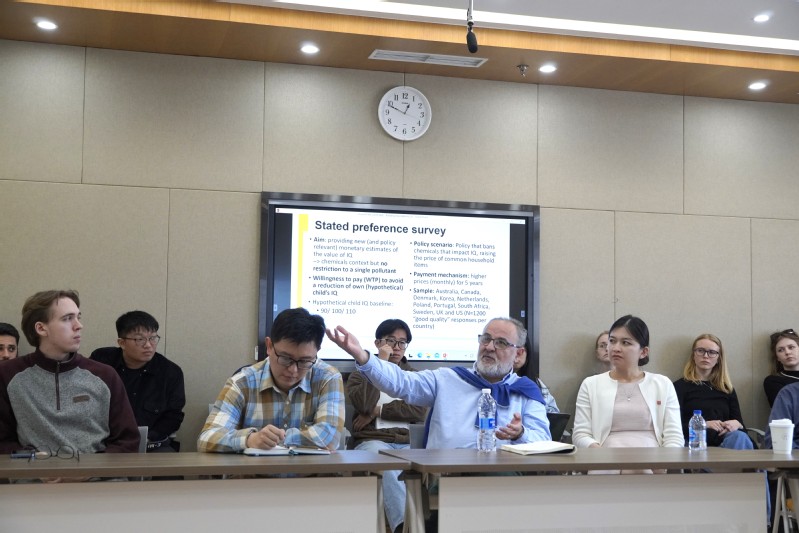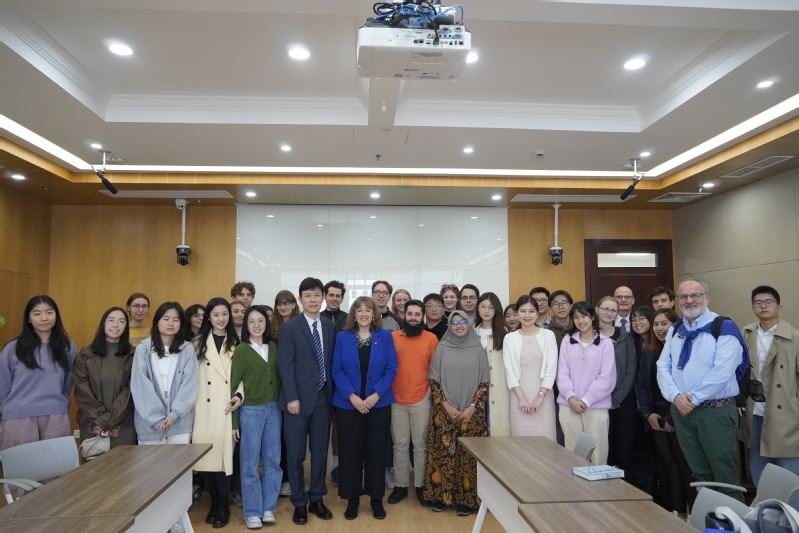Events



On 6 November 2023, the 48th lecture of the Fudan-LSE Lecture Series was held. LSE Vice-President, Professor Susana Mourato, gave a lecture on “The economic benefits of avoiding IQ losses due to chemical exposure: Evidence from 11 countries”. The lecture was hosted by Professor Jing Yijia, Dean of the Institute for Global Public Policy at Fudan University.
Before the lecture, Prof Jing briefly introduced Prof Mourato. Professor Mourato is Vice-President and Pro-Vice Chancellor (Research) and Professor of Environmental Economics at the London School of Economics and Political Science. She provides strategic leadership for LSE’s world-leading research, knowledge exchange and impact, as well as advancing collaborations with key institutional partners and funders. She also oversees the School’s innovation, consulting and entrepreneurship activity, has responsibility for postgraduate research students and for LSE’s British Library of Political and Economic Science. Susana is a leading expert in environmental valuation, developing and applying economic valuation techniques to a wide range of environmental, health, and cultural heritage goods and services. She has also undertaken research on the links between subjective well-being and the environment, and more recently on using insights from behavioural economics to promote sustainable behaviours. She has over 120 scientific publications, including papers in leading journals of her field and 4 books, and many years of experience in advice and policy work for governments, international organisations, industry, and charities.

At the beginning of the lecture, Professor Mourato introduced past research. She pointed out that current research in academia focuses on the effects of chemicals on diseases such as kidney disease, asthma and thyroid function, and that analyses of the possible damage to IQ caused by chemical exposure at the level of intellectual development need further attention and development. Combined with examples from daily life, she emphasized that chemicals are part of our daily life and that most countries have set up institutions to regulate chemical. At the same time, past literature suggests that exposure to chemicals, mostly neurotoxins such as lead, mercury, arsenic, ethanol, etc., has a negative impact on children. Together, this suggests the importance of studying the potential effects of chemical exposure on intellectual development, with the aim of the study being to establish an analytical framework that is comparable on an international scale, and to examine the willingness to pay to avoid the negative effects of chemical exposure on intellectual health in 11 countries.
Professor Mourato then described the stated preference survey methodology used in the research. This method determines people's willingness to pay for the improved benefits of a factor by directly asking them how much they value a particular thing. In this study, the researcher will first explain to the respondents that chemicals affect children's IQ, hypothesize that the development of chemicals will harm children's intellectual development within five years, and that a higher price must be paid to get rid of the negative effects of these chemicals, and finally ask people if they can pay to avoid their children's IQs dropping, and how much they would pay to do so.

Professor Mourato then presented the results of the study, using empirical data to show the willingness of respondents in 11 countries to pay to avoid a one-point decrease in their child's IQ over a five-year period. She pointed out that there were significant differences between the empirical results from different countries. Respondents in Poland and Canada were generally willing to pay more, reflecting the importance they place on intellectual development, which may be related to differences in country-specific public investment in education. The results of the UK study, on the other hand, suggest that respondents' willingness to pay to avoid IQ decline is weak, and the reasons behind this phenomenon deserve further subsequent research. In addition, factors such as income, education, and gender may also affect willingness to pay.
Finally, Prof Mourato emphasized the practical implications of the application of the study results. The results of the study will enrich the existing knowledge in the literature, further enhance the understanding of intellectual development of chemical substances, and provide a reference for policy makers to estimate this specific effect. During the Q&A and comment session, the participating teachers and students discussed the acquisition and use of data, the selection of sample countries, and the potential mechanisms of the effect of chemicals on IQ decline.
